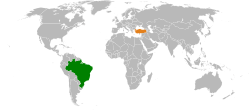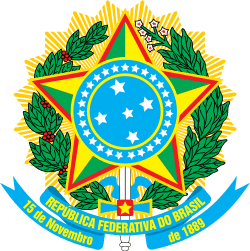Brazil–Turkey relations
 |
|
Brazil |
Turkey |
|---|---|
Relations between Brazil and Turkey have roots that predate the foundation of the modern Republic of Turkey in 1923.
Brazil maintains an embassy in Ankara while Turkey is represented in Brazil through the Embassy of Turkey in Brasília and a Consulate General in São Paulo.[1][2] Both countries are full members of the World Trade Organization (WTO).[3]
Early relations
The Empire of Brazil was the second state in the Americas (after the United States) to enter into treaty relations with the Ottoman Empire (predecessor of modern Turkey). On 5 February 1858, the two empires signed a Treaty of Commerce and Navigation, which had eleven articles and was similar in nature to the other Ottoman capitulations to Christian powers.[4] Brazil set up four consulates in the Ottoman Empire: at Cairo, Jaffa, Mansouri and Tanta. The Ottomans had two consulates in Brazil: at Rio de Janeiro and São Paulo. Although Brazil tried after 1909 to establish consulates in Constantinople (Istanbul) and Beirut, it was unable to since the Ottomans would not allow it and there was no agreement on consular reciprocity. As a result of the opening of diplomatic relations and establishment of formal rules of residence for each other's subjects, over 100,000 Ottoman subjects, mainly from Syria, emigrated to Brazil, often to work on the coffee plantations. About twenty Arabic newspapers were published in Brazil for the Ottoman expatriate population from the late 19th century on. These generally took an anti-Ottoman editorial stance, putting strain on the countries' relations. [5]
Brazil and Turkey, by then both republics, signed a new treaty of friendship on 8 September 1927.[5]
Recent events
In May 2010, Brazil and Turkey signed a tripartite agreement with Iran aimed at partly resolving the diplomatic crisis surrounding Iran's nuclear program.[6]
In 2013 Brazil and Turkey established visa agreement. Countries mutually do not require entrant visas for touristic visitors for stays no longer than three months. However, entrants with other status such as students, legal workers, and long-term visitors will have to obtain visas upon their entries.
Relations between the two countries have been strained as of June 2015, when Brazil recognized the Armenian Genocide.[7] Turkey recalled its ambassador to Brazil soon afterwards.[8]
See also
References
- ↑ "Embassy of Brazil in Ankara". Ministry of External Relations (Brazil). Retrieved 23 November 2012.
- ↑ "Embaixada da Republica da Turquia". Retrieved 24 November 2012.
- ↑ "Members and Observers". World Trade Organization. Retrieved 24 November 2012.
- ↑ Edward A. Van Dyck, Capitulations of the Ottoman Empire Since the Year 1150, Part 1 (Washington, D.C.: Government Printing Office, 1881), p. 23.
- 1 2 For an overview of Ottoman–Brazilian relations in Turkish, see Mehmet Temel, "Osmanli Arşiv Kaynaklarina Göre XIX. VE XX. Yuzyilin başlarinda Osmanli-Brezilya ilişkileri" [Ottoman–Brazilian Relations in the 19th Century and in the Beginning of the 20th, According to Ottoman Archival Sources], Belleten-Türk Tarih Kurumu 68:251 (2004). Information cited here is from the abstract.
- ↑ Javedanfar, Meir (May 18, 2010). "What the Iran Deal is Missing". The Diplomat. Retrieved 24 November 2012.
- ↑
- ↑
External links
- Brazil-Turkey visitor agreement.
- Embassy of Brazil in Ankara
- Embassy of Turkey in Brazil
- Consulate of Turkei in São Paulo

